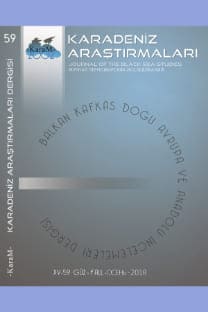Turuncuya Veda: Ukrayna'nın Kritik Seçimi
Ukrayna, sadece bulunduğu Karadeniz havzası açısından değil bölge çapının ötesinde etkiler doğuran politik özellikleri ile önemli bir ülkedir. Bu, doğrudan Ukraynanın gücünden değil, ayrıcalıklı jeopolitiğinden kaynaklanmaktadır. Ülkenin etnik-siyasal bölünmüşlük arz eden yapısı her seçimde analizlerin temel çıkış noktasını oluşturmaktadır. Turuncu Devrim olarak bilinen 2004-2005 süreci, çeşitli nedenlerle başarısızlıkla sonuçlanmış, ülkede Turuncuların karşısında Rusyayı çağrıştıran Mavilerin yeniden yükselişi gözlenmiştir. Bununla birlikte, Batıdan esen Turuncu rüzgâra vedanın mutlak bir Batı karşıtlığını resmi politika haline getirmesi yapısal nedenlerle zorlaşmıştır. Bu çalışmada Rusyanın Ukrayna zaferi, enerji mecburiyetiyle gelişen Batı-Rusya stratejik ilişkileri çerçevesinde değerlendirilmektedir.
Anahtar Kelimeler:
Ukrayna, Turuncu Devrim, Rusya-Ukrayna ilişkileri, Karadeniz jeopolitiği, Batı-Rusya ilişkileri
A Farewell to the Orange: The Critical Election of Ukraine
Ukraine is an significant country not only from the aspect of the Black Sea Basin where it situates, but also with its political characteristics effecting beyond the regional diameter. This does not stem directly from Ukraines power but from its distinguished geopolitical position. Ethnically-politically divided structure of the country has been the starting point for analysis on each election. The process known as Orange Revolution of 2004-2005 concluded with failure because of various reasons, and, anew raising of the Blues who connotes Russia against the Oranges is being observed. However, because of structural reasons, it became difficult for the farewell to Orange wind to convert the anti-West attitude an official policy. In this study, Ukraine victory of Russia is examined within the frame of progressing West-Russia strategic relations.
Keywords:
Ukraine, Orange Revolution, Russia-Ukraine relations, Black Sea geopolitics, West-Russia relations,
___
- “Delivering Tough Love to Ukraine, Georgia”, http://www.cfr.org/publication/19906/delivering_tough_love_to_ukraine _georgia.html?
- “West welcomes Ukraine's Yanukovych as president”,12.02.2010, RIA Novosti, http://en.rian.ru/exsoviet/20100212/157859892.html
- ASKER Ali, “Ukrayna’da seçim sonuçları kesinleşti”, http://www.21yyte.org/tr/yazi.aspx?ID=3358&kat=18, 10 Şubat 2010.
- ERTAN Fikret, “Ukrayna’da dönüm noktası seçim”, Zaman, 17 Ocak 2010.
- HIMMELREICH Jörg, “Energy Security for Ukraine and Europe”, German Mar- shall Fund; Foreign Policy and Civil Society Program: Focus on Ukraine, Jan- uary 11 2010, 1-3.
- Delivering Tough Love to Ukraine, Georgia,
- http://www.cfr.org/publication/19906/delivering_tough_love_to_ukraine_georgia.html?brea
- dcrumb=%2Fregion%2F336%2Fukraine
- İlyas Kamalov, “Karadeniz Bölgesindeki Yeni Gelişmeler”, 9 Şubat 2010, ORSAM,
- http://www.orsam.org.tr/tr/yazigoster.aspx?ID=589
- KAMALOV İlyas, “Karadeniz Bölgesindeki Yeni Gelişmeler”, 9 Şubat 2010, ORSAM, http://www.orsam.org.tr/tr/yazigoster.aspx?ID=589
- KUZIO Taras, “Oligarchs, Tapes and Oranges: ’Kuchmagate’ to the Orange Revo- lution”, Communist Studies and Transition Politics, Vol. 23, No. 1, March 2007, 30-56.
- KUZIO Taras., “Election Reveals Ukraine’s Geographic Political Divisions,” RFE/RL Newsline, Vol. 6, No. 73, Part II, 18 April 2002.
- LEVY Clifford J., “Opposition Leader Declares Victory in Ukraine”, The Newyork Times, http://www.nytimes.com/2010/02/09/world/europe/09ukraine.html?p agewanted=1.
- MARCU Silvia, “The Geopolitics of the Eastern Border of the European Union: The Case of Romania-Moldova-Ukraine”, Geopolitics, 14: 3, 409-432.
- NORDBERG Marc, “Domestic factors influencing Ukrainian foreign policy”, Eu- ropean Security, Vol.7, No.3, Autumn 1998, 63-91.
- RODGERS Peter, “Understanding Regionalism and the Politics of Identity in Ukraine’s Eastern Borderlands”, Nationalities Papers, Vol. 34, No. 2, May 2006, 157-174
- SOLONENKO Iryna, “External democracy promotion in Ukraine: The role of the European Union”, Democratization, Vol. 16, No. 4, August 2009, 709-731.
- STELMAKH Anastasia, “Ukrayna ve Turuncu Devrimin Güncel Durumu”, KARASAM 9. aylık Strateji Toplantısı, 22 Ekim 2009, Giresun.
- ISSN: 2536-5126
- Yayın Aralığı: Yılda 4 Sayı
- Başlangıç: 2004
- Yayıncı: Osman Karatay
Sayıdaki Diğer Makaleler
Atasözü ve Deyimler Arasındaki Farklar
Girit Meselesi'nin belirsizlik yılları
Tarık Buğra'nın Hikâye Dilinde İroni
XVIII. Yüzyılda Tuna Demirkapısı Ve Girdaplar İdaresi
Altın Orda, Osmanlı Ve Memlüklerin Aksak Timur'a Karşı Birlik Kurma Meselesine Dair
Kuzey Kafkasya'da müridizmin kurumsallaşması ve Gazavat
Örgütlerde Uygulanan Personel Güçlendirme Yöntemleri: Türk Kamu Yönetiminde Personel Güçlendirme
